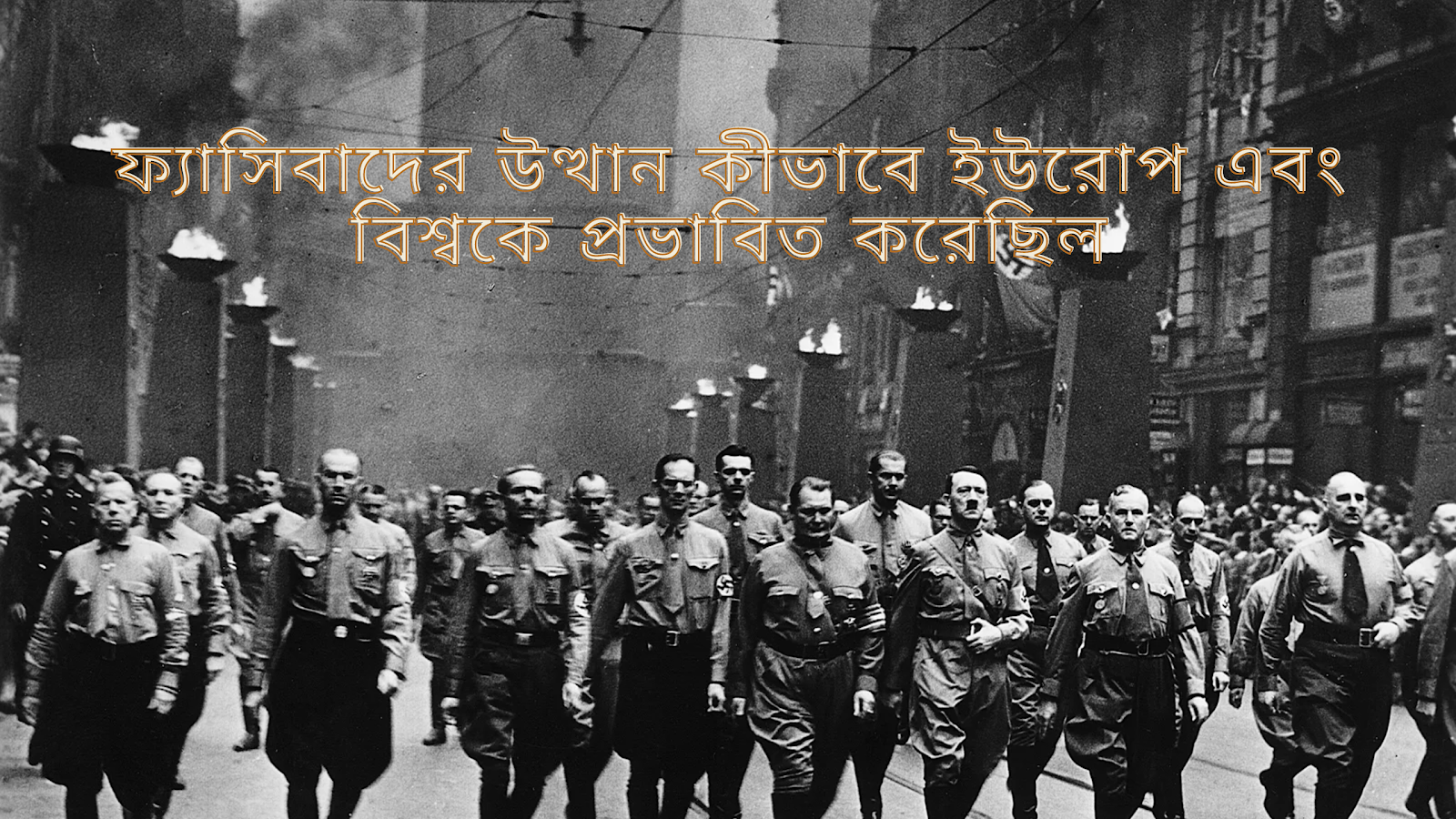How did the rise of fascism affect Europe and the world
The
rise of fascism in Europe during the first half of the 20th century had a
profound impact on the continent and the world. Fascism, a political ideology
that emphasized authoritarianism, nationalism, and the supremacy of the state
over the individual, emerged during a time of great social, economic, and
political upheaval in Europe. In this essay, we will examine how the rise of
fascism impacted Europe and the world, exploring its causes, consequences, and
lasting impact on the 20th century.
One of the main causes of the rise of fascism in Europe was the
aftermath of World War I. The war had devastated much of Europe and left it
vulnerable to new political movements that promised to bring stability, order,
and national pride. In Italy, Benito Mussolini rose to power in 1922, creating
the first fascist government. In Germany, Adolf Hitler and the Nazi Party rose
to power in 1933. Each of these movements emphasized the importance of the
nation, the use of violence, and the suppression of individual rights and
freedoms.
The consequences of the rise of fascism were severe. In Europe,
fascism led to the outbreak of World War II, which lasted from 1939 to 1945 and
resulted in the deaths of millions of people. The policies of fascist
governments also led to the persecution of minority groups, such as Jews,
homosexuals, and Romani. The Holocaust, in which millions of Jews were
systematically murdered by the Nazis, remains one of the darkest periods in
human history.
Fascism also had a significant impact on the wider world. The rise
of fascist governments challenged the existing international order and led to
the formation of new alliances and partnerships. For example, fascist Italy
formed an alliance with Nazi Germany and Japan, known as the Axis Powers, while
other nations aligned themselves against the fascist threat. This led to a
global conflict that reshaped the political landscape of the world.
The rise of fascism also left a lasting legacy on the 20th century.
The lessons of the Holocaust and the atrocities committed under fascist rule
led to a renewed emphasis on human rights and the importance of individual
freedoms. It also contributed to the emergence of new political and social
movements, such as the civil rights movement and the women's rights movement, which
sought to combat the injustices perpetrated by fascist governments.
In conclusion, the rise of fascism in Europe had a significant
impact on the continent and the wider world. Driven by social and political
turmoil, fascism rose to prominence in the aftermath of World War I, leading to
the outbreak of World War
ফ্যাসিবাদের উত্থান কীভাবে
ইউরোপ এবং বিশ্বকে প্রভাবিত করেছিল
20 শতকের প্রথমার্ধে ইউরোপে ফ্যাসিবাদের উত্থান মহাদেশ
এবং বিশ্বে গভীর প্রভাব ফেলেছিল। ফ্যাসিবাদ, একটি রাজনৈতিক মতাদর্শ যা কর্তৃত্ববাদ,
জাতীয়তাবাদ এবং ব্যক্তির উপর রাষ্ট্রের আধিপত্যের উপর জোর দিয়েছিল, ইউরোপে একটি বড়
সামাজিক, অর্থনৈতিক এবং রাজনৈতিক উত্থানের সময় আবির্ভূত হয়েছিল। এই প্রবন্ধে, আমরা
পরীক্ষা করব কীভাবে ফ্যাসিবাদের উত্থান ইউরোপ এবং বিশ্বকে প্রভাবিত করেছিল, এর কারণ,
পরিণতি এবং 20 শতকে স্থায়ী প্রভাব অন্বেষণ করব।
ইউরোপে ফ্যাসিবাদের উত্থানের একটি প্রধান কারণ ছিল প্রথম
বিশ্বযুদ্ধের পরের ঘটনা। যুদ্ধটি ইউরোপের অনেক অংশকে ধ্বংস করে দিয়েছিল এবং স্থিতিশীলতা,
শৃঙ্খলা এবং জাতীয় গর্ব আনার প্রতিশ্রুতি দিয়ে নতুন রাজনৈতিক আন্দোলনের জন্য এটিকে
দুর্বল করে রেখেছিল। ইতালিতে, বেনিটো মুসোলিনি 1922 সালে ক্ষমতায় অধিষ্ঠিত হন, প্রথম
ফ্যাসিবাদী সরকার তৈরি করেন। জার্মানিতে, অ্যাডলফ হিটলার এবং নাৎসি পার্টি 1933 সালে
ক্ষমতায় অধিষ্ঠিত হয়। এই আন্দোলনগুলির প্রতিটিই জাতির গুরুত্ব, সহিংসতার ব্যবহার
এবং ব্যক্তি অধিকার ও স্বাধীনতার দমনের উপর জোর দেয়।
ফ্যাসিবাদের উত্থানের পরিণতি ছিল মারাত্মক। ইউরোপে, ফ্যাসিবাদ
দ্বিতীয় বিশ্বযুদ্ধের সূত্রপাত ঘটায়, যা 1939 থেকে 1945 সাল পর্যন্ত স্থায়ী হয়েছিল
এবং লক্ষ লক্ষ মানুষের মৃত্যু হয়েছিল। ফ্যাসিবাদী সরকারগুলির নীতিগুলি ইহুদি, সমকামী
এবং রোমানির মতো সংখ্যালঘু গোষ্ঠীগুলির উপর অত্যাচারের দিকে পরিচালিত করেছিল। হলোকাস্ট,
যেখানে লক্ষ লক্ষ ইহুদি নাৎসিদের দ্বারা পরিকল্পিতভাবে হত্যা করা হয়েছিল, মানব ইতিহাসের
সবচেয়ে অন্ধকার সময়গুলির মধ্যে একটি।
ফ্যাসিবাদও বিস্তৃত বিশ্বে উল্লেখযোগ্য প্রভাব ফেলেছিল।
ফ্যাসিবাদী সরকারের উত্থান বিদ্যমান আন্তর্জাতিক ব্যবস্থাকে চ্যালেঞ্জ করে এবং নতুন
জোট ও অংশীদারিত্ব গঠনের দিকে পরিচালিত করে। উদাহরণস্বরূপ, ফ্যাসিবাদী ইতালি নাৎসি
জার্মানি এবং জাপানের সাথে একটি জোট গঠন করেছিল, যা অক্ষ শক্তি হিসাবে পরিচিত, যখন
অন্যান্য দেশগুলি ফ্যাসিবাদী হুমকির বিরুদ্ধে নিজেদেরকে একত্রিত করেছিল। এটি একটি বিশ্বব্যাপী
সংঘাতের দিকে পরিচালিত করেছিল যা বিশ্বের রাজনৈতিক ল্যান্ডস্কেপকে নতুন আকার দিয়েছে।
ফ্যাসিবাদের উত্থান বিংশ শতাব্দীতেও একটি স্থায়ী উত্তরাধিকার
রেখে গেছে। হলোকাস্টের পাঠ এবং ফ্যাসিবাদী শাসনের অধীনে সংঘটিত নৃশংসতা মানবাধিকার
এবং ব্যক্তি স্বাধীনতার গুরুত্বের উপর নতুন করে জোর দেয়। এটি নতুন রাজনৈতিক ও সামাজিক
আন্দোলনের উত্থানেও অবদান রাখে, যেমন নাগরিক অধিকার আন্দোলন এবং নারী অধিকার আন্দোলন,
যা ফ্যাসিবাদী সরকার দ্বারা সংঘটিত অন্যায়ের বিরুদ্ধে লড়াই করতে চেয়েছিল।
উপসংহারে, ইউরোপে ফ্যাসিবাদের উত্থান মহাদেশ এবং বিস্তৃত
বিশ্বে একটি উল্লেখযোগ্য প্রভাব ফেলেছিল। সামাজিক ও রাজনৈতিক অস্থিরতার দ্বারা চালিত,
প্রথম বিশ্বযুদ্ধের পর ফ্যাসিবাদ প্রাধান্য পায়, যার ফলে বিশ্বযুদ্ধ শুরু হয়









No comments:
Post a Comment